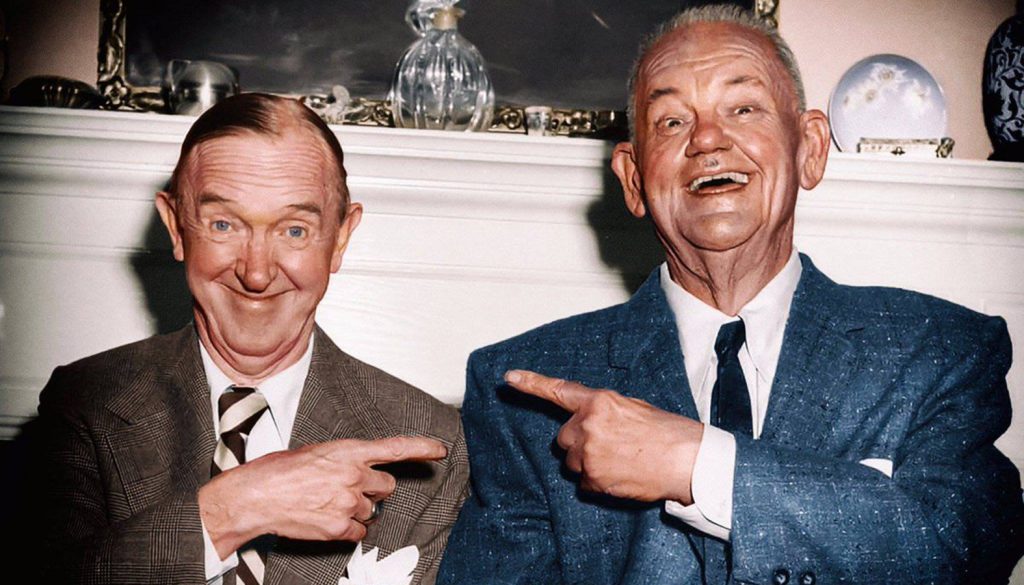On Saturday mornings, my brother and I would get up early so we could have unfettered access to the black and white television set in our living room. Our dad would be at work, our mom had more important things to tend to, and older siblings wanted to sleep in. The world was all ours.
There might be some leftover popcorn from the night before — Friday was “popcorn night.” Our mom made a huge batch of it and laid out a blanket on the living room floor and we were allowed that one night to stay up late and watch TV to our heart’s content.
Saturday was too good of a day to waste lying in bed. My brother and I would rise early and start the day off with watching old Laurel and Hardy short subject comedies on one of the local channels.
Stan Laurel and Oliver Hardy were a Hollywood comedy team with few equals. They began in the silent era, though much of their comic genius was physical, when the “talkies” came the team’s vocal skills and language — just as illogical as their pratfalls — made them flourish all the stronger.
Their boss, movie mogul Hal Roach, became a multimillionaire on the talents of Stan and Ollie. They should have died millionaires themselves, but they didn’t. They died financially strapped and far from the limelight.
Oliver Hardy (the portly one for the uninitiated) suffered all the physical calamities that came with obesity. A serious gambling habit, a couple of marriages, and overall fiscal mismanagement left a chronically ill Ollie living in a tiny track home in the San Fernando Valley in the 1950s.
Stan, the skinny one, fared even more poorly, at least financially. In 1937, Stan Laurel earned $135,000 for his comedic services.
For some perspective, in 1937 the average cost of a home was $4,100, the average yearly wage was $1,800, a gallon of gas was 10 cents and a year at Harvard would set you back $420. I don’t think $420 could get you out of the Harvard bookstore with more than two books under your arm today.
Even though Oliver Hardy was not making the same amount in 1937 as Stan was, he was still bringing home $88,000 in 1937, and that would have bought a lot of houses.
I have a strange, peripheral connection to Stan Laurel. In 1938, he was arrested for drunk driving, going 60 miles an hour on the wrong side of Reseda Boulevard. in the Valley. The LAPD officer who pulled him over happened to be a great uncle of mine. The digital record of the LA Times coverage of Stan’s ensuing trial reads like a Laurel and Hardy script, as Laurel took the stand and chalked the erratic driving and over-indulgence of liquor to “trouble with the wife.”
I used to feel sorry for Stan and Ollie. It was saddening to think they squandered all that fortune. Having recently joined a Laurel and Hardy fan group on Facebook though, my sadness is gone. The reason: The Facebook page is filled with photos of Stan and Ollie, not in the prime of their careers when they were making so much money, but in their twilights.
The most noteworthy common denominator from all these pictures is the joy in their eyes and the smiles on their faces. Granted, they were artists and knew how to play a part, but I find a genuine joyfulness in these photos, despite knowing many of them were taken when physical, economic, and career troubles were at their peak.
One of the last photos taken of the team was after Ollie had a massive stroke. He had lost a tremendous amount of weight. The once jolly fat man was now skeletal. Yet, even in this condition, Ollie seemed infinitely capable of joy.
Stan spent the remainder of his days in a tiny studio apartment in Santa Monica, far removed from his former resplendent residence in Cheviot Hills. He steadfastly corresponded with fans via mail and received famous and not-so-famous visitors. From all accounts he lived in simplicity and gratitude.
When a screenwriter is describing what his character is seeing, the notation POV (“point of view”) is used. Stan Laurel, a comic genius, a man who knew wealth and poverty, had a very insightful POV indeed.
As we close the books on 2021 and fight the folly of worrying what could have or should have been, we could all take a cue from a little man in a bowler hat who played the fool but lived his last years in wisdom.

